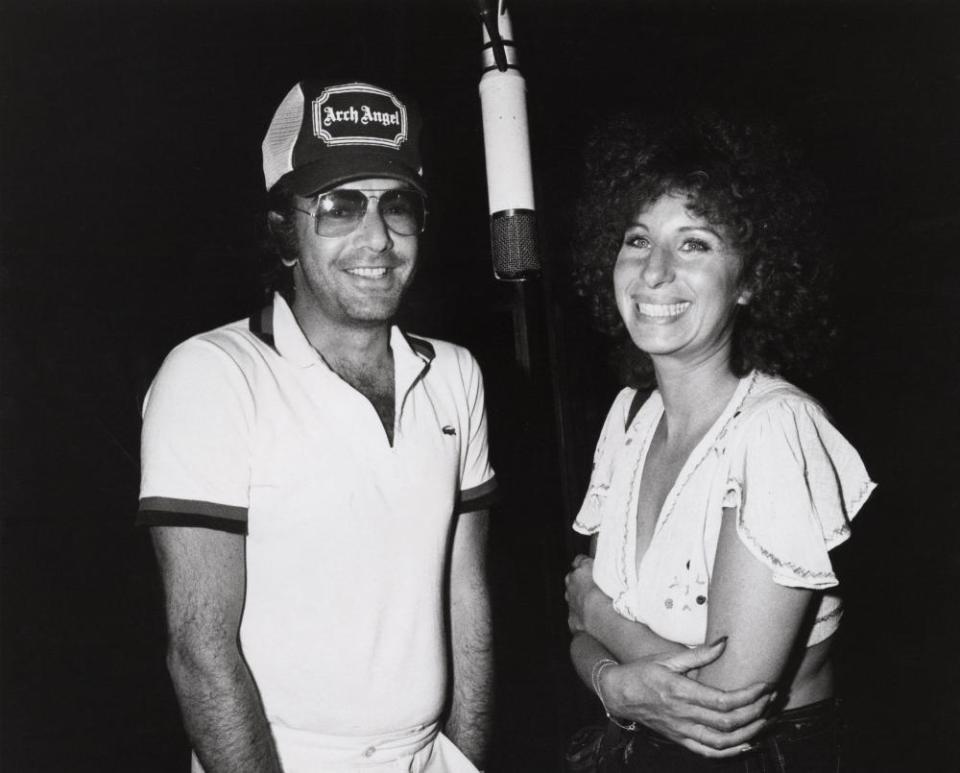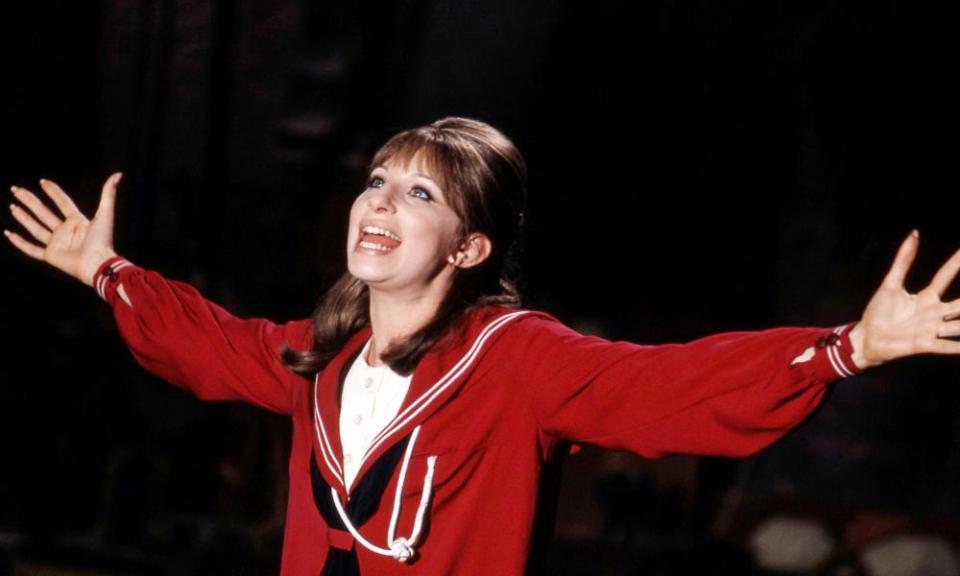Barbra Streisand’s 20 greatest songs – ranked!
20. Guava Jelly (1974)
Earning its place here for its WTF factor: Barbra Streisand covering a Bob Marley track (albeit one indebted to Steam’s 1969 bubblegum smash Na Na Hey Hey Kiss Him Goodbye) before the Wailers broke the US. Bizarrely, it works: gleeful 70s pop soul, gentle reggae inflection in the chorus, Streisand’s vocal suggesting grasped the song’s lubricious undercurrent.
19. Promises (1980)
A hidden gem from Guilty: overshadowed by its two big hits that rank much higher up this list, it’s a richly melodic, exceptionally classy and beautifully understated bit of mid-tempo disco, with a fabulous chorus. Seek out the 12in mix, which extends the track to six minutes and subtly amps up its dancefloor qualities.
18. Night of My Life (2005)
Guilty Pleasures failed to match the commercial success of Streisand’s previous collaboration with Barry Gibb, but it was her best pop album in decades. And Night of My Life sees Gibb doing one thing the Bee Gees steadfastly refused to do: returning to the sound of Saturday Night Fever. A minor triumph.
17. Left in the Dark (1984)
Streisand and Meat Loaf producer/songwriter Jim Steinman should have been a match made in theatrical AOR heaven, but she only worked with him once. Left in the Dark is relatively restrained by Steinman’s standards but is still a riot of booming drums and choral backing vocals with a killer power ballad at its centre.
16. Mother (1971)
Not all Streisand’s 70s rock covers worked – her version of Life on Mars moved David Bowie to complain – but her version of John Lennon’s infamous wail of misery is frankly amazing: ditching the original’s primal-scream-inspired howling, bringing in an orchestra and gospel organ, and somehow retaining its emotional punch.
15. Shake Me, Wake Me (When It’s Over) (1975)
Buried on 1975’s Lazy Afternoon is the improbable, but delightful sound of Streisand taking on Philadelphia International-style mid-70s dancefloor soul: big orchestration, wah-wah guitars, backing vocals with a distinct hint of the Three Degrees about them (check out the When Will I See You Again-esque sighs at the start).

14. You Don’t Bring Me Flowers (1978)
You Don’t Bring Me Flowers had a bizarre genesis. Neil Diamond wrote and recorded it – weirdly, given its dolorous tone, for a sitcom – Streisand covered it, and a Kentucky radio programme director spliced the two versions together while in the throes of divorce and began broadcasting it: 70s weepy ballad history was made.
13. The Way He Makes Me Feel (1983)
The Way He Makes Me Feel might have won an Oscar for best original song had the vote not been split with a nomination for Papa Can You Hear Me?, another song from Streisand’s directorial debut, Yentl. It was certainly good enough: Michel Legrand’s melody is beautiful, the orchestral arrangement sumptuous, Streisand’s performance impassioned.
12. People (1964)
People nearly didn’t make the cut for Funny Girl until Streisand sang it at a preview to rapturous response. It became one of her signature songs, notwithstanding the late Clive James’s snarky suggestion that the lyric “people who need people” should have been followed by the line “are to be avoided”.
11. Somewhere (1985)
The highlight of Streisand’s self-explanatorily titled The Broadway Album is the finale, an impressive reimagining of the Bernstein and Sondheim classic. Streisand’s performance is impeccable and moving, while its lengthy – and surprisingly abstract – electronic intro shifts it from the 1950s Manhattan of West Side Story into a more modern urban environment.
10. Stoney End (1971)
The Stoney End album was a definite attempt to give Streisand a hip makeover – Joni Mitchell and Randy Newman covers, a song called Free the People. It was never going to make Rolling Stone readers clasp her to their hearts, but the Laura Nyro-penned title track is freewheeling pop-soul brilliance.
9. My Man (1965)
Fanny Brice’s theme song didn’t appear in Funny Girl, the 1964 Broadway show about her life in which Streisand had starred, although it cropped up in the 1968 film: you wonder if that decision was influenced by the stunning version Streisand recorded in between the two, for her album/TV special My Name Is Barbra.
8. No More Tears (Enough Is Enough) (1979)
No More Tears can’t really fail: vocal duties shared with Donna Summer, Giorgio Moroder at the peak of his powers in the producer’s seat, a killer ballad-style introduction leading, on the 12in version at least, 10 minutes of hammering synths, OTT rock guitar and frenzied cease-your-bullshit-and-sling-your-hook-pal duetting.
7. Woman in Love (1980)
Hooking Streisand up with the Bee Gees was an inspired idea: critically battered, but with their astonishing songwriting facility fully intact, the Gibb brothers had everything to prove and duly poured their all into Guilty. Its lead single went to No 1 in 19 countries, testament to its dramatic, cinematic power.

6. Happy Days Are Here Again (1962)
Streisand’s early success was an anomaly: an album of standards and show tunes by a 21-year-old that became a huge hit in the teeth of Beatlemania. Happy Days … shows why: her voice is incredible, the slow arrangement digs past the lyric’s jolly surface, turning it into a song not about joy, but gritted-teeth stoicism.
5. My Father’s Song (1975)
Co-written by Rupert Holmes – later to favour the world with Escape (the Piña Colada Song) – My Father’s Song seems to tap into Streisand’s childhood: a woman whose father died when she was a year old singing about inescapable paternal influence. Certainly, she sang it as if she meant every word.
Related: Barbra Streisand: ‘It’s the funniest thing to me that people still can’t get my name right’
4. Don’t Rain on My Parade (1964)
The showstopper from Funny Girl has been covered by other artists – from Bobby Darin to art-rockers Japan – but is inexorably linked to Streisand: she recorded it first and no one has matched her reading, perhaps because of the faint but noticeable hint of desperation she injects into the song’s defiant optimism.
3. Evergreen (1976)
Streisand is better known as a song interpreter than a writer, per se, but the music on Evergreen was all hers: the lyrics were the work of Paul Williams. It makes you wish she had written more: you could call it MOR, but it’s MOR of a particularly sophisticated and genuinely affecting kind.
2. Guilty (1980)
All three Bee Gees had a hand in writing the highlight of Streisand’s greatest pop album. Its title track breezes effortlessly along, the melody soaring over an understated soft-rock backing, Streisand sings wonderfully – her voice a striking contrast to that of Barry Gibb – and the chorus is just magnificent.
1. The Way We Were (1973)
Streisand’s career was experiencing a brief lull after 1973’s global music-influenced album … And Other Musical Instruments, a rare flop. The Way We Were turned her fortunes around. An Oscar-winning instant standard, tearjerking and timeless – you can imagine it hailing from the 1940s rather than the 70s – it’s exquisitely written and blessed with a lead performance that is all about restraint and subtlety: listen to the way she phrases the line “what’s too painful to remember”, pausing for an instant before singing the word “painful” as if she is literally struggling to say it. It makes the moment Streisand finally lets rip at 2.40 all the more cathartic and stinging.
• My Name is Barbra by Barbra Streisand is published by Century on 7 November.

 Yahoo News
Yahoo News 
